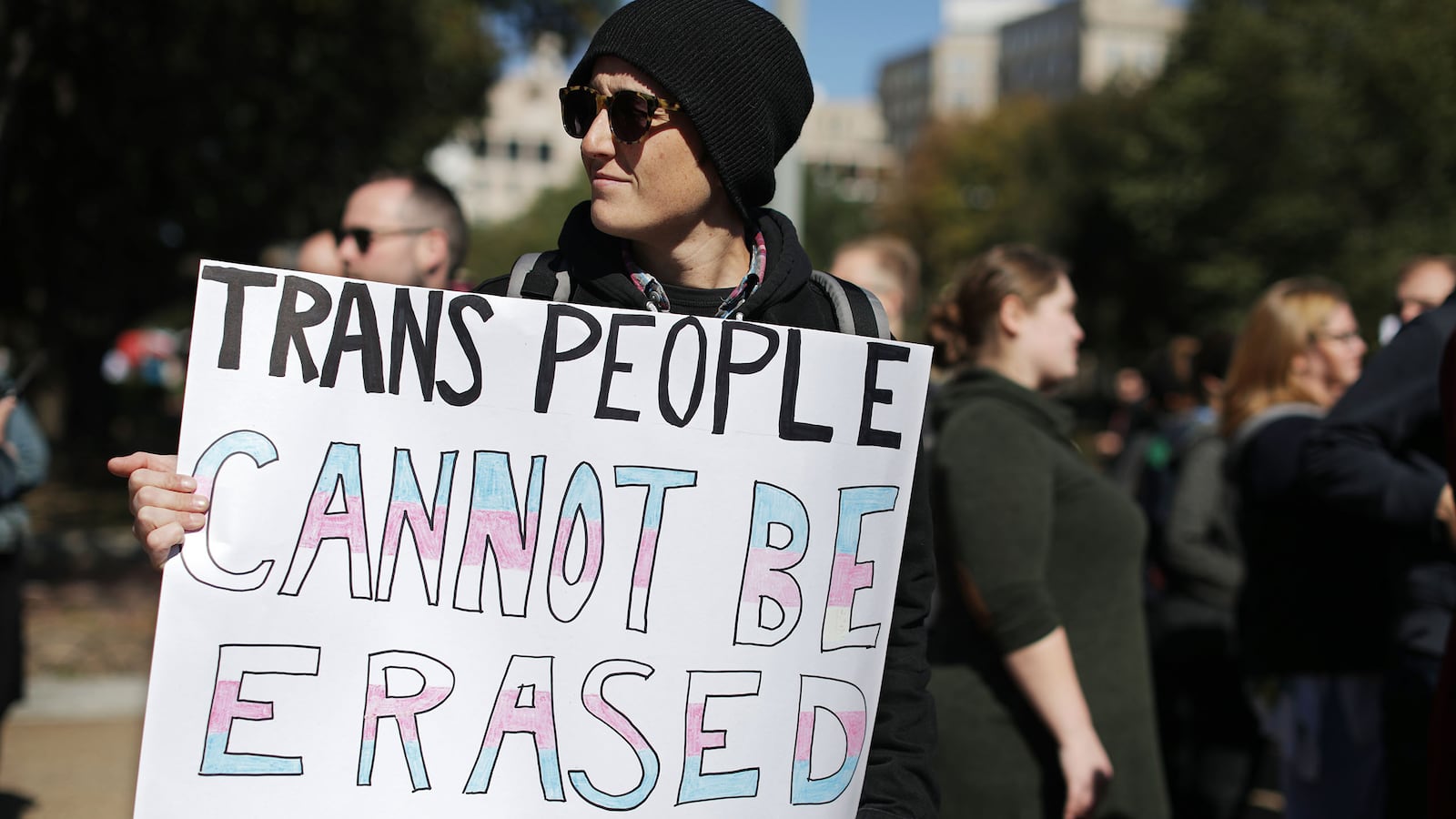On social media and in front of the White House, through tweets and on the streets, the transgender community sent a message Monday: We will stay strong.
The protests were sparked by a Sunday New York Times report that the Trump administration’s Department of Health and Human Services had proposed a definition of “sex” that would, effectively, deny the existence of transgender people by narrowly defining the term’s use within existing federal civil rights legislation.
According to the Times, HHS has been urging other government agencies to adopt that same definition, with plans to present it to the Justice Department for review by the end of 2018.
Deviating from her prepared remarks at a Monday morning press conference held by LGBT rights groups, National Center for Transgender Equality executive director Mara Keisling said, “I am livid but clear-headed, I feel threatened but I am resolute.”
“We will be here long after this administration is in the trash heap,” Keisling said.
The longtime advocate’s words captured a sentiment that came across loudly in the hours after the Times report: The hashtag #WontBeErased emerged shortly after the leaked memo, providing a digital forum for transgender people to express resilience.
For a small community—last estimated by the Williams Institute at UCLA to comprise about 1.4 million adults in the United States—the flood of pictures and personal stories proved a powerful point: Transgender people are not a siloed-off population, living in isolation, but rather an essential part of society’s fabric. They are doctors and nurses and teachers and daughters and and soldiers and songwriters.
That growing awareness is reflective of broader culture change: As GLAAD noted, the number of Americans who say they know or work with a transgender person doubled from 8 percent in 2008 to 16 percent in 2015.
By 2017, Pew Research Center was able to report that 37 percent of U.S. adults now know a transgender person—an acquaintance, a friend, a co-worker, or a family member. It is clearer than it has ever been that transgender people are here and have always been here.
This is why news of the HHS memo sparked the response that it did. If implemented in its leaked form, some federal agencies would begin defining sex as “male or female based on immutable biological traits identifiable by or before birth.”
The leaked definition also specified that a person’s sex would be whatever is stated on their “birth certificate, as originally issued” unless “reliable genetic evidence” could be provided to the contrary—which would seemingly require a system of genetic testing.
Legally speaking, this language would preclude the government from treating existing bans on sex discrimination in civil rights law—under Titles VII and IX—as transgender-inclusive, even though several federal courts have concluded that they are.
“This is not a new idea,” said Fatima Goss-Graves, president of the National Women’s Law Center, at Monday morning’s presser, of the legal precedents that have been established through the courts. “This is a decades-long idea that they’re messing with.”
But although LGBT advocates promised to continue battling the Trump administration in the courts—as Lambda Legal chief strategy officer Sharon McGowan joked, “We are a family, and this family has lawyers”—the most resonant words spoken on Monday were those of endurance and survival.
Transgender activist Ruby Corado spoke directly to younger transgender people at Monday’s press conference, saying, “To every transgender person who is sitting at home doubting about their future, as an elder I am standing here to guarantee that it will be okay.”
Rea Carey, executive director of the National LGBTQ Task Force, said that “transgender, gender non-conforming, and intersex people are some of the strongest, most resilient people I know.”
“I am proud to be a transgender woman of color,” added Aryah Lester of the National Minority AIDS Council. “What I’m not is a cartoon character that can be erased.”
Masen Davis, CEO of Freedom for All Americans, spoke movingly about his experience being out as an openly transgender man for over two decades.
“We cannot and we will not let fear take us back to the closet,” he said, adding, “I fought way too hard to be who I am to be erased at this point.”
Indeed, transgender people were reminded Monday that although no administration has targeted transgender people as pointedly as the Trump administration—first rolling back restroom guidance for transgender students, then attempting to ban transgender people from the military—the community has endured much in the past.
Monica Roberts, a Houston-based transgender activist and something of an elder stateswoman for the imperiled community, wrote in a blog post, “The bottom line is our trans ancestors and elders have seen worse attacks, and they not only withstood them, they managed to build a movement that we have now taken international.”
Like the many transgender people participating in protests around the country Sunday night—and then Monday at the White House—Roberts pledged to keep fighting, saying, “Frankly, we have nothing to lose and everything to gain.”
In D.C. on Monday afternoon, transgender people and allies marched under the slogan “We will not be erased,” as speakers continued to insist that the HHS could not make them return to an era of hiding and invisibility.
It was a protest, yes, but also proof that no policy can accomplish what the HHS apparently hopes it can: If the Trump administration thought that they could wish transgender people out of existence with a few specious sentences, evidence to the contrary literally appeared on their doorstep.





